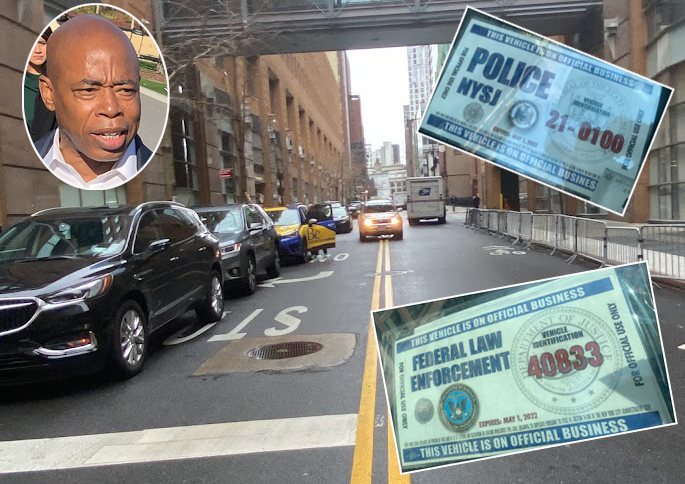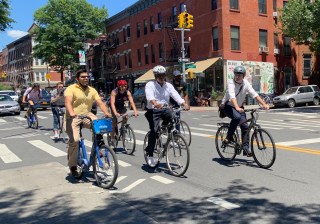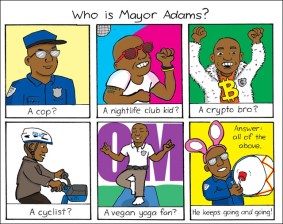Op-Ed: Mayor Adams’s Blind Spot on Placard Abuse is Alarming, Given His ‘Covid and Crime’ Focus

Eric Adams is supposed to be New York City’s first bike mayor. A frequent cyclist, Adams said during the mayoral campaign, “If elected, you’re going to see me on my bike all the time riding to and from City Hall in a real way.” And, sure enough, on his second day in office, Adams indeed biked, taking an electric Citi Bike from Gracie Mansion to some TV interviews near Lincoln Center.
The pictures and videos of an impeccably dressed Adams riding an electric bike to work showed that he understands the transformative power of bikes — and how biking can be a regular part of any worker’s day. But on one crucial issue of bike safety, Adams remains a failure: he does not understand, nor does he care to understand, the corruptive toll of placard abuse.
I learned that once again in a text message exchange with the new mayor.

Yes, I have his cellphone number; in fact, many people do. I received it back in 2019 after an initial Twitter debate with the then-Brooklyn Borough President over his continued illegal parking on the sidewalk next to Borough Hall. He happily gave out the digits during his placard abuse summit, and encouraged attendees to message him. We texted a few times after the summit, but Adams never actually addressed placard abuse — his or anyone else’s. In fact, during the campaign, he dismissed placard abuse as “a New Paltz” problem, his way of putting down rival candidate Andrew Yang for even bringing it up.
On Saturday, I walked by a row of parked cars that completely blocked the travel lane on Duffield Street and were parked illegally at the western cul-de-sac end of Myrtle Avenue in Downtown Brooklyn, a location with a chronic placard abuse problem (it is near the FDNY headquarters, a nest of placard abuse). So I texted the newly minted mayor about it: “Why are city workers allowed to park in a no standing zone just because they have a placard?” and added a photo of how the illegal parking made the roadway less safe for pedestrians, cyclists and even motorists, who are forced to drive over the centerline of the road because vehicles are parked in a clearly marked no standing zone.

Two of the scofflaw parkers displayed FDNY placards, which are not legal in no standing zones.
A few minutes later, the mayor texted me back, “I have one focus right now,” he wrote, “COVID AND CRIME. It is a luxury to talk about anything else at this moment. We will deal with other items when we get them under control. Thank you.” [Streetsblog has confirmed that the phone number in question is, indeed, the mayor’s.]
In a brief follow-up exchange, I wrote, “You can’t delegate government issues to someone else? Surely, the NYPD have internal affairs and a transport division?!?” And the mayor responded, “Thanks for your input. I will run the city for the next for [sic] years.”
First, I appreciate that the mayor responded. But his answers were distressing. For starters, placard abuse is a crime, so a law-and-order mayor could certainly address the issue from that perspective. Indeed, no less a law-and-order advocate as NY1’s Errol Louis has called placard abuse a “gateway drug” of city corruption, something much-documented by the seminal Twitter account, @placardabuse, which has long revealed the connection between unpunished police parking violations and other police violations, such as Streetsblog’s reports of the NYPD’s lying about 311 reports.
“Placard abuse is a crime though,” tweeted one street safety advocate. “How can we expect the city to address crime if there’s rampant criminality among government employees?”
Placard abuse is a crime though. How can we expect the city to address crime if there's rampant criminality among government employees?
— Brian F-H (@BrianEFH) January 2, 2022
But most important, placard abuse is a safety issue and a Covid issue. The pandemic has brought a bike boom to New York, so enforcing placard law-breaking in bike lanes is squarely in the mayor’s self-declared “COVID AND CRIME” mandate.
During the campaign, Adams promised to build protected bike lanes at a rate far faster and broader than the previous administration. And as a cyclist, he also knows that a bike lane that took years to create can be ruined with a parked car and a piece of laminated paper or a theft vest. And it’s obviously not a problem just with the NYPD and the FDNY; in Downtown Brooklyn, even members of the borough’s District Attorney office join in on the abuse.
I asked @BrooklynDA's Comms Director @OrenYaniv why vehicles with District Attorney placards have been blocking the Adams Street bike lane for months…and he BLOCKED ME!
If you want the Adams St bike lane to be car free, please tag @OrenYaniv and ask him what's going on! pic.twitter.com/zO8HE7ugyO
— NYC Bike Lanes (@NYCBikeLanes) November 30, 2021
Many people in city government — and apparently our new mayor — dismiss placard abuse as a secondary issue, a government version of a smug, apathetic, illegally-parked driver who tells cyclists, “Just go around.”
As we have learned painfully, there are many examples of cyclists who just went around only to put themselves in harm’s way in traffic. Australian tourist Madison Lydon would be alive today if she hadn’t been forced into traffic by an illegally parked cab on Central Park West in 2018. Hugo Garcia might be alive today if he didn’t have to bike in traffic to avoid the door of a cab on Third Avenue in 2019. This cyclist, whose name wasn’t reported, might be alive today if he wasn’t crushed to death between a truck and an illegally parked car. Schermerhorn Street might be a safe route for cyclists heading to the new bike path on the Brooklyn Bridge if it wasn’t filled with illegally parked police vehicles.
Oh and the SUV he was sandwiched against shouldn't have been parked there. This cyclist would be alive if that driver obeyed the "NO PARKING Anytime"
— NYC Bike Lanes (@NYCBikeLanes) December 11, 2020
Clearly, Adams does not want to expend his political capital to address the issue before the end of the Covid crisis, so that’s all the more reason why he should support a Council bill by former lawmaker Steve Levin — Intro 2159 — that would allow residents to report illegal placard parking, and keep a portion of the subsequent parking fine. Unlike 311, it would not require the police to respond, and then, in turn, not bother to write a ticket. It would function like the city’s existing idling law, which allows people to register with the city to report violators of this important anti-pollution law.
Levin’s bill did not pass before his term ended, so the bill would have to be reintroduced — perhaps by his successor Lincoln Restler, who has himself vowed to end placard abuse.
But it shouldn’t come to that — we shouldn’t need a citizen army to fight NYPD and other agency corruption. That should be the job of the mayor — as part of his battle against “COVID AND CRIME” … and everything else.
In the final weeks of the de Blasio administration, the mayor announced digital placards that could be validated with hand-held readers. These readers wouldn’t tell traffic enforcement agents anything they didn’t already know. No placard is ever valid in a no standing zone nor did they confer the privilege to park in a bike lane. Placard abuse has never been about confusion over parking rules — it’s about petty corruption that’s deeply ingrained in the NYPD.
And it’s about basic safety.
@NYCBikeLanes is a Twitter account run by an actual Downtown Brooklyn resident. The account is anonymous due to harassment from the NYPD.



